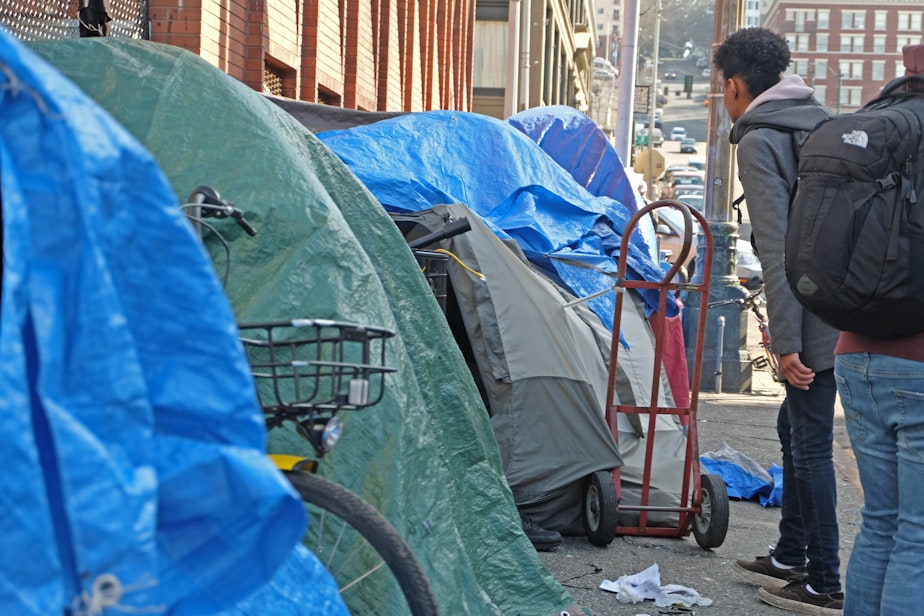Meet the homeless outreach team funded by downtown property owners

Socks, hand warmers, granola bars.
These are just a few of the things that Michelle Jones and Chris Park carry with them when they do outreach work in downtown Seattle. These are items people living on the city’s streets might need — and items that can help Jones and Park start a conversation.
They’re part of a team of outreach workers with the Metropolitan Improvement District (MID), a group funded by downtown property owners and managed by the Downtown Seattle Association.
In a time when debates around homelessness often pit businesses and neighborhoods against people who are homeless, this team is one example of how local residents are trying to help fuel solutions.
On a recent sunny morning, Jones and Park leave their offices and head for a group of nearby tents set up along the sidewalk.
Their goal is to build relationships and try to help the people who are homeless in their neighborhood stabilize.
In 2018, the team made more than 1,600 contacts with people on the streets, and more with people who came to their offices for help.
Sponsored
“We want to be able to get to know someone, we want to be able to identify them, we want to be able to learn their name,” said Park, the team’s outreach manager.
Park said it's rare that he gets angry calls from a business-owner just looking to move a homeless person along. Mostly he gets calls from people who are concerned about the well-being of people near their businesses, he said.
"We will first check in with the business and talk to the individual who made the call in order to get an idea of what is going on," Park said by email. "We let [the business] know that we are not bouncers and aren't going to ask [the person] to leave or move along. We also inform them that if the individual doesn't want to talk to us or declines services then we will need to walk away and respect their choice."
If the team already has a connection with someone it makes it easier to offer help or respond effectively, Park said. The team does not disclose information about the individual's name or case management situation to the businesses.
On top of getting to know people, Park said the team also focuses on working out what each individual needs and wants.
Sponsored
“And evaluating, can we meet that need or is there someone else who can do it better? And if so, not just passing along the information to them, but also offering, 'Would you like to go and see them?'”
On that sunny morning, Park and Jones meet someone who wants help – a young woman who is pregnant and struggling with addiction.
Park tries to get her an appointment at a local clinic. They can’t see her until next month, so he asks a team of nurses who do street outreach to come by when they’re out next.
Park said it’s hard to find a shelter bed for someone who is pregnant and using. He’s called several places but they’re holding beds for people in unauthorized camps that are being cleared that day. He’ll keep trying.
He lets the woman know where the MID offices are. Like most people he meets, he tells her to come by if she needs anything – services, a public restroom, a cup of coffee.
Sponsored
As he walks away, Park counts this interaction as a win because the woman is OK with him coming back to check on her.
Park’s outreach partner Michelle Jones said this is how their team works. They try to respond quickly.
They offer some case management and some referrals and help with housing. The MID helped 22 people into housing last year, according to Park, often paying the move-in costs.
But the team is less equipped to focus all their energy on housing, and more focused on some of the steps that come before.
They do things like help people pay for a phone or transportation, refer them to employment training or treatment and re-connect them with services or case managers they’ve already had contact with.
Sponsored
They also helped dozens of people get IDs in 2018.
“If someone were to stop me right now and say, ‘Hey, can you help me get my birth certificate?’ I'd say, ‘Absolutely. Let's go back to the office. Let's do it,'" Park said.
Jones knows how hard it can be to navigate the system alone. She was homeless when she was younger.
The MID outreach team has been around in one form or another for years. At one point they received city funding, but they lost that when contracts were re-bid and the focus was shifted to housing outcomes. City documents show the team’s application for funding scored low.
Still, James Sido with the Downtown Seattle Association said downtown property owners wanted to keep funding the outreach work, even when city funding fell away.
Sponsored
"From the beginning, if you go back to the founding of the outreach team, I think part of the thinking there was that we can possibly be just a small part of the solution," Sido said.
Recently, other neighborhoods and business districts in places like Ballard and SoDo have also been hiring case managers and outreach workers of their own. They’re desperate for solutions.
Still, they say more is needed, pushing city officials for things like reform of the criminal justice system and better public safety.
Park said he believes systemic changes and more affordable housing are needed to truly tackle the crisis on the streets.




